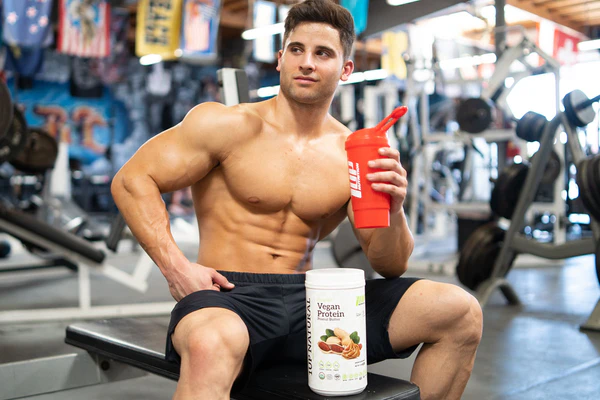
Introduction
Building muscle isn’t just about lifting weights—nutrition plays a crucial role in achieving those gains. If you’re looking to build muscle effectively, knowing what to eat is just as important as your workout routine. Proper nutrition fuels your workouts, aids recovery, and helps you see results faster.
In this guide, we’ll explore essential nutrition tips to maximize your muscle-building efforts. We’ll cover everything from the right balance of macronutrients to meal timing and hydration. For more detailed insights on how to boost muscle growth through diet, you can check out wellhealthorganic.com/how-to-build-muscle-know-tips-to-increase-muscles.
What is “Nutrition Tips on How to Build Muscle: What to Eat for Optimal Gains”?
When it comes to building muscle, your diet is just as important as your workout routine. “Nutrition Tips on How to Build Muscle: What to Eat for Optimal Gains” focuses on how to use food to support and enhance your muscle-building efforts. This involves understanding the right balance of nutrients, timing your meals correctly, and choosing foods that provide the energy and building blocks your body needs.
Here’s what this topic covers:
Macronutrient Balance:
Proteins: Essential for repairing and growing muscle tissues. Learn which high-protein foods are best for muscle recovery and growth.
Carbohydrates: Your primary source of energy, crucial for powering through workouts and replenishing muscle glycogen.
Fats: Important for hormone production and overall health, helping to optimize muscle growth and recovery.
Meal Timing:
Pre-Workout: What to eat before exercising to fuel your workout and boost performance.
Post-Workout: The best foods to consume after exercising to aid muscle recovery and growth.
Hydration:
How staying hydrated supports muscle function and overall fitness, and tips for maintaining proper hydration.
Supplements:
Overview of popular supplements that can enhance muscle building, such as protein powders, creatine, and BCAAs, and how they can fit into your nutrition plan.
Sample Meal Plan:
Practical meal ideas that combine proteins, carbs, and fats to help you stay on track with your muscle-building goals.
Common Pitfalls:
Common mistakes people make with their nutrition and how to avoid them to ensure you’re getting the most out of your diet.
Why Is This Important?
Proper nutrition is crucial for muscle building for several reasons:
1. Supports Muscle Growth
Protein Synthesis: Adequate protein intake provides the amino acids needed for muscle repair and growth.
Muscle Recovery: Essential nutrients help speed up recovery after workouts, reducing muscle soreness and preventing injury.
2. Enhances Workout Performance
Energy Levels: Carbohydrates are the primary source of energy for high-intensity workouts. Eating enough carbs ensures you have the stamina to push through your exercise routines.
Optimal Strength: Proper nutrition supports overall strength, allowing you to lift heavier weights and perform more challenging exercises.
3. Improves Muscle Repair
Efficient Recovery: Post-workout meals that include protein and carbs help replenish glycogen stores and repair muscle fibers more effectively.
Reduced Fatigue: Proper nutrition reduces fatigue and ensures that muscles recover fully between workouts.
4. Balances Hormone Levels
Hormone Production: Healthy fats and a balanced diet help maintain optimal levels of hormones like testosterone and insulin, which are essential for muscle growth.
Prevents Imbalances: Proper nutrition helps prevent hormone imbalances that can hinder muscle development and overall fitness progress.
5. Ensures Proper Hydration
Muscle Function: Staying hydrated is vital for muscle contractions and overall function. Dehydration can lead to reduced performance and increased risk of injury.
Recovery: Hydration aids in the recovery process, helping to transport nutrients to muscle cells and flush out waste products.
Step-by-Step Guide: Nutrition Tips on How to Build Muscle
Building muscle involves more than just hitting the gym; it requires a strategic approach to your diet. Here’s a step-by-step guide to help you optimize your nutrition for muscle growth:
Step 1: Calculate Your Caloric Needs
Determine Your Basal Metabolic Rate (BMR): Use an online calculator or consult a nutritionist to find out how many calories your body needs at rest.
Adjust for Activity Level: Multiply your BMR by an activity factor based on your exercise routine to determine your Total Daily Energy Expenditure (TDEE).
Set a Caloric Surplus: To build muscle, consume 250-500 extra calories above your TDEE to support muscle growth.
Step 2: Balance Your Macronutrients
Protein:
Aim for 1.2-2.2 grams of protein per kilogram of body weight daily.
Include lean meats, eggs, dairy, legumes, and protein supplements in your diet.
Carbohydrates:
Carbs should make up about 45-65% of your total calorie intake.
Focus on complex carbs such as whole grains, fruits, and vegetables.
Fats:
Healthy fats should constitute 20-35% of your daily calories.
Incorporate sources like avocados, nuts, seeds, and olive oil.
Step 3: Plan Your Meals and Snacks
Pre-Workout Meal:
Eat a balanced meal 1-2 hours before your workout, including protein and carbohydrates.
Example: Greek yogurt with fruit and a small handful of oats.
Post-Workout Meal:
Consume a meal or snack within 30-60 minutes after exercising that includes protein and carbohydrates.
Example: A protein shake with a banana or a chicken sandwich on whole-grain bread.
Regular Meals:
Distribute your meals evenly throughout the day to maintain steady energy levels and support muscle growth.
Aim for 3 main meals and 2-3 snacks.
Step 4: Stay Hydrated
Daily Water Intake:
Drink at least 8-10 glasses of water a day, adjusting based on your activity level and climate.
Include electrolytes if you have intense workouts or sweat a lot.
During Workouts:
Sip water regularly throughout your exercise routine to stay hydrated.
Step 5: Consider Supplements
Protein Powders:
Use whey, casein, or plant-based protein powders to meet your protein needs, especially if you struggle to get enough from food.
Creatine:
Supplement with creatine monohydrate to improve strength and muscle mass.
BCAAs:
Consider branched-chain amino acids (BCAAs) to support muscle recovery and reduce soreness.
Conclusion
Building muscle is not just about lifting weights—what you eat is equally important. By focusing on the right balance of protein, carbs, and fats, timing your meals effectively, and staying hydrated, you can maximize your muscle gains and support your overall fitness goals. Remember to keep track of your progress and make adjustments as needed.



